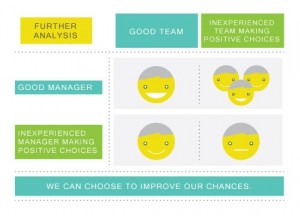What it takes to achieve team success


This is part II of last week’s article 5 Ways to achieve team success.
A Better Paradigm via Our Choices
In Figure 2 below, we have changed the “bad” headings from Figure 1 to “inexperienced,” giving confused folks the benefit of the doubt. Moving two or more of the quadrants into a higher probability of success is not only desirable, but entirely possible through good choices!
Figure 2 – Team / Leader Matrix Making Positive Choices
You can succeed from the onset by making good initial choices involving cooperation and trust and all of the other team virtues we discuss in the previous team blog. We see in the above graphic that we can make positive choices with inexperienced individuals that can turn a failure into a win (as is shown in quadrants 2 and 3). While we realize this is quite simplistic and optimistic—it is clear that by using a little forward-thinking analysis that we can improve results and gain a higher probability of project success.
As a volunteer manager, move into tasks slowly and patiently and you might even be able to turn quadrant 4 around. As a team member, you need to be helpful, trusting, and kind to one another.
Attitude is a most important choice up front.
Choosing to be helpful, cooperative, and patient provides for a greater probability of success no matter how one might assign probabilities to the above scenarios.
Winning teams (good attitudes) find ways to win all (well, most) of the time.
[bookboon-recommendations id=”838045c1-4dee-4462-9c85-a3390101b8f6″ title=”You might also find these books interesting…”]
Great teams learn to win. In addition, once you know what winning feels like you will want more of it. You will seek out further wins with greater confidence. Part of creating a winning team is learning to trust one another. Unfortunately, we see less of this trusting behavior than we believe we should. It is not normal for people to wake up and choose to trust. Mostly, we start out very guarded and protecting. Remember folks, this is your volunteering gig, not your paid workplace where you must survive (stay employed) in order to eat and pay the rent.
We argue that you should give healthy cooperation a shot. Don’t just walk off—trust your teammates to do the right thing. Ignore the gripes of teammates who do not deliver. If you contribute, even in spite of setbacks and naysayer attitudes, rewards will come. When they do, make sure your team’s win includes some fun. Take the time to enjoy each other’s successes, company, and celebrate the big wins and the small ones! To learn more please see Chapter 4 in “Volunteering.”
About the author: Karl’s volunteer management experience spans three decades. He recently retired as a chief strategy officer, after having implemented the strategic plan of a 1500+ employee service sector organization. He has taught courses in management, business and economics, operations research, and project management. He holds degrees in engineering and economics and is near completion of a second book on the management of highly competitive environments. His initial volunteering experience involved the management of a food buying co-op while an undergraduate. Recently he has provided strategic planning, project management and technical assistance to numerous volunteer organizations and communities and has written extensively on the subject. Karl resides in the Missouri Ozarks and can be reached at kburgher@SunshineValley.org.
[bookboon-book id=”838045c1-4dee-4462-9c85-a3390101b8f6″ title=”This article is written by the author of this eBook”]




